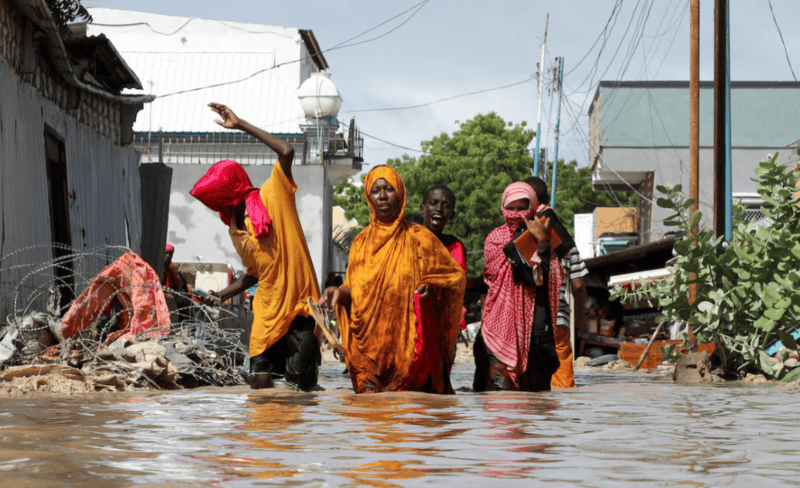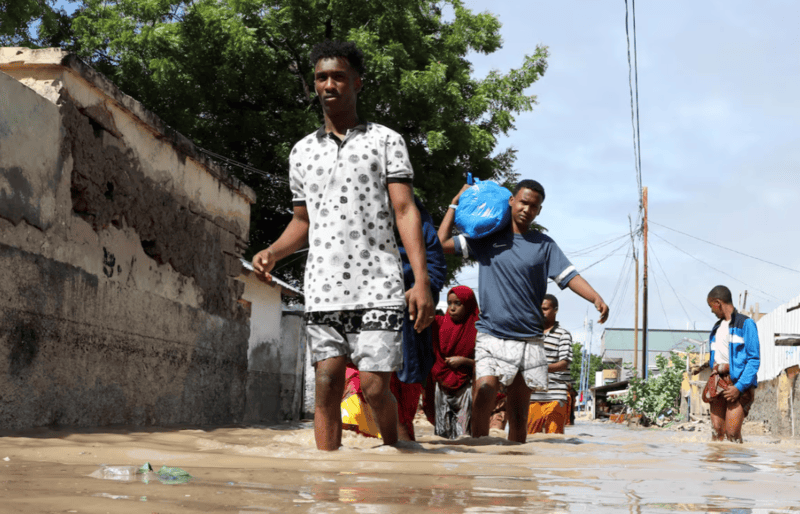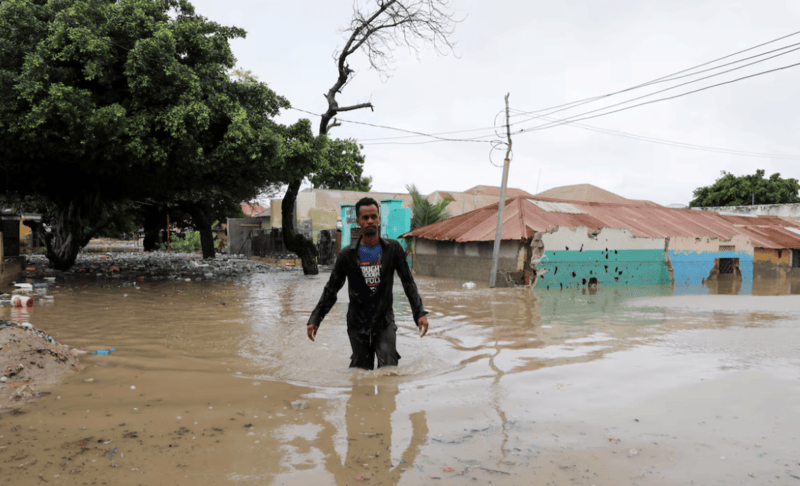Seven dead, houses submerged as heavy rains cause severe flooding in Mogadishu

According to Saleh Hassan, a spokesperson for the mayor of Mogadishu, the flooding also led to the collapse of nine houses and inundated the homes of 200 families. Key roads, including those connecting to Aden Abdulle International Airport, were severely affected, disrupting transportation and leaving residents stranded.
A heavy downpour in Mogadishu, Somalia, on Friday night caused severe flooding that left at least seven people dead, according to city officials.
The mayor’s office confirmed on Saturday that the torrential rains also damaged roads and disrupted transport across Somalia’s capital.
More To Read
- How to make sweet and savoury plantains at home
- Somalia on high alert as Marburg virus outbreak hits neighbouring Ethiopia
- Mogadishu police, intelligence agents crack down on armed groups after surge in street crime
- Somalia declares drought emergency as millions face hunger after failed rains
- International Rescue Committee warns millions at risk as drought intensifies across Northern Somalia
- Somali Region frees ‘121 unlawfully detained’ people, ‘pardons’ two jailed journalists, Rights Commission says
According to Saleh Hassan, a spokesperson for the Mayor of Mogadishu, the flooding led to the collapse of nine houses and submerged the homes of 200 families. Key roads, including those connecting to Aden Abdulle International Airport, were severely affected, disrupting movement and leaving residents stranded.
“We have now confirmed that at least seven people have died, including two women. Nine houses have collapsed and several others have been submerged,” Saleh said.
Among the dead was a young boy whose body was recovered from the debris on one of the damaged streets on Saturday.
“This morning, my friends joined me with hammers and spades, and we managed to remove his body,” a resident, Nuradin Mohammed, told Reuters on Saturday.
The heavy rains, which lasted approximately eight hours, overwhelmed the city’s drainage system, submerging neighbourhoods and causing significant property damage.
 A Somali family wades through flood waters, as they flee after overnight rains destroyed their home last night in Wadajir district of Mogadishu, Somalia May 10, 2025. REUTERS
A Somali family wades through flood waters, as they flee after overnight rains destroyed their home last night in Wadajir district of Mogadishu, Somalia May 10, 2025. REUTERS
Nine houses collapsed, and over 200 families were affected as floodwaters inundated their homes. Key infrastructure was also impacted, with six major roads sustaining damage, further hindering mobility across the city.
The flooding has been attributed to Mogadishu’s poor drainage system, which has long rendered the city vulnerable even to moderate rainfall. Experts noted that the latest downpour was particularly intense, overwhelming existing infrastructure and raising concerns about urban planning and disaster preparedness.
Local sources reported that some of the worst-hit areas included Howlwadaag and Hodan districts, where roads constructed by the Banadir regional administration had sustained severe damage. The district commissioner of Hamar Jajab confirmed that a mother and her child had died after their house collapsed under the pressure of the floodwaters.
The Banadir regional administration urged residents to avoid flooded areas and instructed district commissioners to assist those affected by the flooding, particularly families living in ageing or poorly constructed homes.
 A Somali family wades through flood waters, as they flee after overnight rains destroyed their home last night in Wadajir district of Mogadishu, Somalia May 10, 2025. REUTERS
A Somali family wades through flood waters, as they flee after overnight rains destroyed their home last night in Wadajir district of Mogadishu, Somalia May 10, 2025. REUTERS
Witnesses indicated that residents living in houses previously demolished by the government were among the worst affected, as they had not been provided with alternative shelter. Many of the displaced, including children and the elderly, were struggling with cold conditions and injuries in makeshift living arrangements.
As heavy rains continue to affect the city, calls have grown louder for immediate action to improve Mogadishu’s drainage infrastructure, with many emphasising the need for long-term solutions to prevent future disasters.
Top Stories Today












































